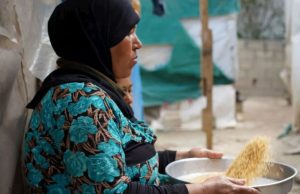Twelve years on, Syrian refugees still struggling
Twelve years after conflict devastated their country, Syrian refugees face deepening debt and hunger, a new report says.
As their displacement drags on and host countries struggle with multiple crises, Syrian refugees in the Middle East are slipping further into poverty, it says.
The report by the UN refugee agency UNHCR says that around 6.8 million Syrians continue to live as refugees worldwide, of whom 5.5 million are hosted in countries neighbouring Syria.
In Jordan, 660,000 registered Syrian refugees are trapped in exile.
 About 135,000 of them have found sanctuary in refugee camps such as Za’atari and Azraq while the rest live in host communities.
About 135,000 of them have found sanctuary in refugee camps such as Za’atari and Azraq while the rest live in host communities.
“Those who could at first rely on savings or support from host families are now increasingly in need of help to cover their basic needs,” the report says.
“About four out of five Syrian refugees in Jordan are living under the national poverty line of about US$3 a day,” it says.
Iraq, which hosts around 260,000 Syrian refugees, has 86 per cent living in camps and are food insecure or vulnerable to food insecurity.
In Egypt, UNHCR has registered more than 145,000 Syrian refugees.
The agency’s data shows that an estimated 66 per cent of refugees and asylum-seekers in Egypt were living below the national poverty line in 2022.
Despite generous donor support, the needs in countries hosting Syrian refugees continue to grow, forcing UNHCR and other humanitarian agencies to make difficult decisions.
Last year’s Regional Refugee and Resilience Plan, which is coordinated by UNHCR and the UN Development Program, was only 39 per cent funded.
“Without steady and reliable funding, more Syrian refugees will plunge deeper into despair in 2023,” the UNHCR report said.
Since the beginning of the Syria crisis 12 years ago, more than 14 million Syrians have been forced to flee their homes in search of safety.
In 2023, the Resilience Plan is seeking US$5.7 billion to reach Syrian refugees and host community members with assistance.
In Lebanon, 58 per cent of Syrian refugee families live in inadequate and unsafe shelters, and 67 per cent are moderately or severely food insecure, the report says.
In Jordan, 77 per cent of refugees living in host communities (non-camp refugees) are food insecure or vulnerable to food insecurity; 49 per cent of households are living below the abject poverty line.
In Turkey, 90 per cent of refugees cannot fully cover their monthly expenses or basic needs, while 94 per cent have adopted survival strategies such as reducing food consumption or borrowing money, the UNHCR report says.
Another report by Stanford University’s Immigration Policy Lab studied Syrian refugees in Lebanon and their motivations as to whether or not to return home.
It identified factors in this decision, including: safety; jobs in Syria; public services in Syria; military conscription in Syria; jobs and public services in Lebanon; and, family and friend networks.
And it found that supporting refugees economically in their host countries would not dampen their desire to return home – challenging the traditional ‘push’ and ‘pull’ models of refugee movement.
“While a minority of refugees want to return in the short term, most refugees hope to return at some point in the future,” the researchers said.
“Many refugees intend to return to their home country when threats to their physical, economic, and social well-being have decreased, and when they feel that they possess credible information.
“We find that more than two thirds of Syrians in Lebanon want to return home, and prospects for a good job and access to public services in Lebanon do not influence people’s likelihood of staying.
“The findings also suggest that, at least while a home country remains unsafe, humanitarian agencies can support refugee well-being without undermining the goal of safe voluntary return.
“Efforts to deliver humanitarian assistance and provide broader economic opportunities appear unlikely to substantially change the calculus of refugees in the absence of improving conditions at home.
“Thus, continuing support and the provision of economic opportunities to the displaced can benefit both refugees and host societies, without exacerbating the long-term challenges of hosting governments,” the researchers said.
Read the full report: Twelve years on, Syrian refugees face deepening debt and hunger – UNHCR Thailand












